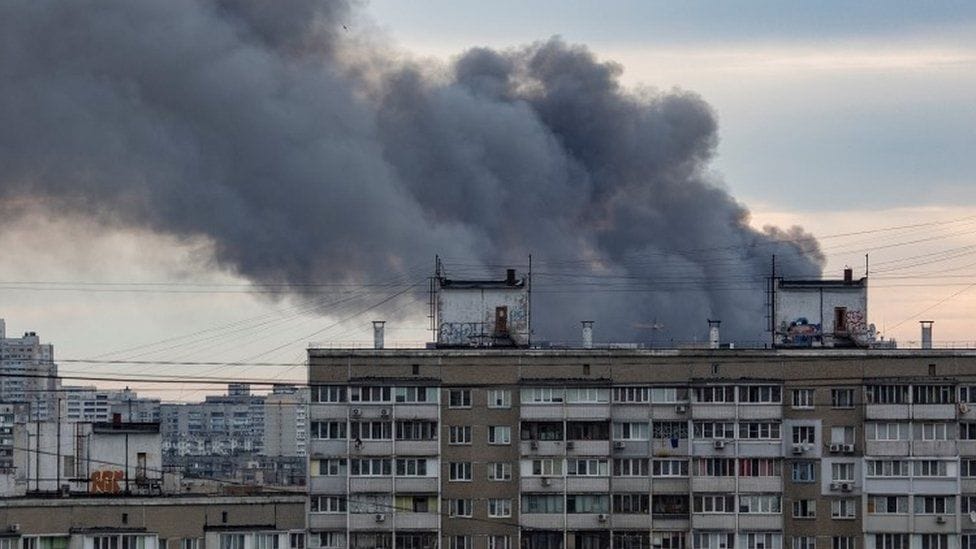In recent days, the military conflict between Ukraine and opposing forces has escalated, resulting in a series of attacks that have further disrupted civilian life and posed serious health risks. One of the most troubling incidents occurred when an attack on Kyiv led to significant smoke pollution, affecting not just the capital but also extending to other cities, including Odessa. Among the most alarming outcomes was the reported impact on a maternity hospital in Odessa, raising serious concerns about the vulnerability of healthcare facilities during such attacks.
The attacks on Kyiv intensified during the night, reportedly involving missile strikes and artillery fire. Eyewitness accounts described dark clouds of smoke hanging over the city, dramatically altering the skyline and contributing to what many have described as an atmosphere of despair. Individuals emerged from their homes and shelters only to be met with the choking smog that filled the air, creating an immediate health concern for residents.
Local government officials have been working tirelessly to respond to the crisis. Emergency services have been deployed to assess the damage and mitigate the impact of smoke inhalation on the population. Hospitals are now reporting an increase in patients with respiratory issues, highlighting the immediate health fallout from the attack. Authorities are advising citizens to stay indoors, close windows, and wear masks when venturing outside, as air quality has dramatically decreased.
At the same time, reports from Odessa have revealed that the maternity hospital was caught in the crossfire of the ongoing conflict. An explosion nearby resulted in structural damage to the facility. Fortunately, there were no reports of casualties among the patients or staff at the hospital, and emergency protocols were activated to ensure the safety of expectant mothers and newborns. However, the incident serves as a stark reminder of the precarious situation in which healthcare facilities find themselves during wartime.
Medical professionals have expressed deep concern regarding the implications of such military actions for public health. Hospitals are essential services, often working under challenging conditions, and the added burden of military strikes only exacerbates their ability to deliver care. Medical staff are facing unprecedented pressures, with shortages of necessary supplies and resources already affecting many hospitals across the region.
In addition to the immediate health implications, this incident underscores the broader consequences of conflict on civilian infrastructure. Schools, hospitals, and other public services are increasingly becoming collateral damage in aggressive military actions. As the attacks continue, debates around humanitarian law and the protection of civilians gain urgency, with international organizations calling for measures to safeguard healthcare facilities.
The United Nations and various human rights organizations have voiced their concerns over the escalating violence and its impact on civilians. They highlight the need for a renewed dialogue aimed at de-escalating the conflict and protecting those who are most vulnerable to its consequences. This includes not only the patients in hospitals but also the general population, who are often left to navigate a dangerous environment with little to no support.
Meanwhile, the Ukrainian government has continued to emphasize its right to defend its territory against external aggression, while also calling for international support and intervention to assist civilians affected by the ongoing conflict. The situation remains tense, with geopolitical ramifications extending beyond the immediate borders of Ukraine, as regional allies and adversaries react to developments on the ground.
As the world watches the situation unfold, the stories emerging from cities like Kyiv and Odessa serve as reminders of the human cost of warfare. Families are affected, lives disrupted, and basic services like healthcare are threatened. With every escalation in violence, the humanitarian crisis deepens — a reality that many find difficult to fathom yet must confront in their daily lives.
As the situation remains fluid, local and international agencies are taking steps to provide humanitarian assistance and support to those impacted by the ongoing crisis. This includes the distribution of emergency supplies, medical assistance, and psychological support for those traumatized by the recent events. However, the scope of the crisis presents challenges that require a coordinated response from both local authorities and the global community.
In this tumultuous environment, the stories of resilience and recovery are emerging even amid the chaos. Communities are coming together to support one another, showcasing the spirit of hope and determination that persists despite the overwhelming challenges. Efforts are being made to rebuild and restore normalcy in the lives of countless individuals whose futures have been cast into uncertainty by the ongoing conflict.
As nations around the world respond to the crisis, discussions regarding the future political direction of Ukraine and the broader region are intensifying. The road ahead remains uncertain, punctuated by the realities of war and human suffering. However, the call for peace and protection of civilian life is one that resonates globally, serving as a reminder of the need for concerted efforts to ensure that such tragedies do not continue to unfold.
In conclusion, the attack on Kyiv not only brings immediate consequences in terms of health and safety but also highlights broader issues regarding the impact of military actions on civilian infrastructure, particularly hospitals. The situation in Ukraine serves as a poignant reminder of the need for attention, dialogue, and resolution in the face of conflict. It is imperative for the international community to remain engaged in seeking pathways for de-escalation and to reinforce protections for vulnerable populations caught in these dire circumstances.
